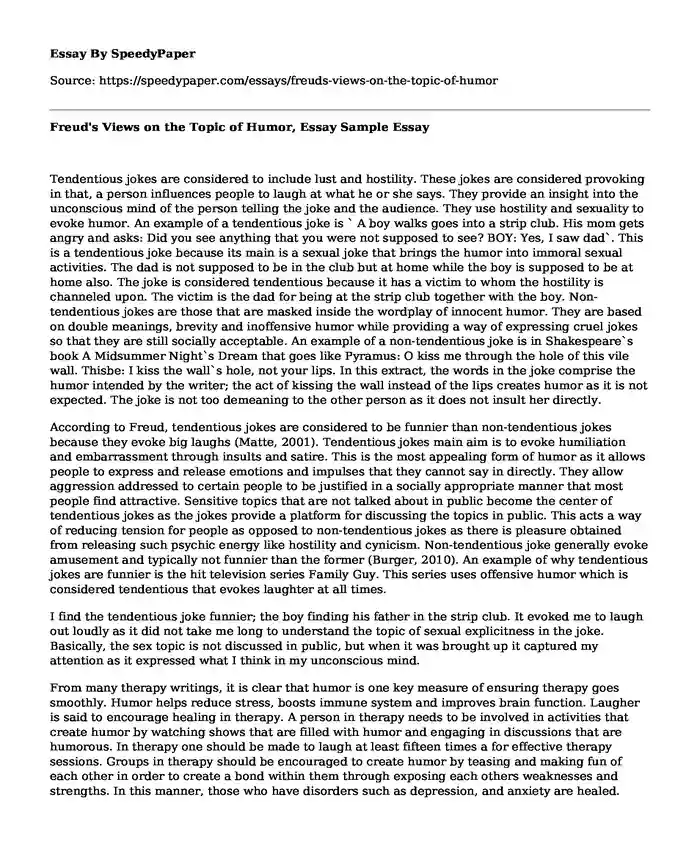
| Type of paper: | Essay |
| Categories: | Psychology Sexes |
| Pages: | 3 |
| Wordcount: | 693 words |
Tendentious jokes are considered to include lust and hostility. These jokes are considered provoking in that, a person influences people to laugh at what he or she says. They provide an insight into the unconscious mind of the person telling the joke and the audience. They use hostility and sexuality to evoke humor. An example of a tendentious joke is ` A boy walks goes into a strip club. His mom gets angry and asks: Did you see anything that you were not supposed to see? BOY: Yes, I saw dad`. This is a tendentious joke because its main is a sexual joke that brings the humor into immoral sexual activities. The dad is not supposed to be in the club but at home while the boy is supposed to be at home also. The joke is considered tendentious because it has a victim to whom the hostility is channeled upon. The victim is the dad for being at the strip club together with the boy. Non-tendentious jokes are those that are masked inside the wordplay of innocent humor. They are based on double meanings, brevity and inoffensive humor while providing a way of expressing cruel jokes so that they are still socially acceptable. An example of a non-tendentious joke is in Shakespeare`s book A Midsummer Night`s Dream that goes like Pyramus: O kiss me through the hole of this vile wall. Thisbe: I kiss the wall`s hole, not your lips. In this extract, the words in the joke comprise the humor intended by the writer; the act of kissing the wall instead of the lips creates humor as it is not expected. The joke is not too demeaning to the other person as it does not insult her directly.
According to Freud, tendentious jokes are considered to be funnier than non-tendentious jokes because they evoke big laughs (Matte, 2001). Tendentious jokes main aim is to evoke humiliation and embarrassment through insults and satire. This is the most appealing form of humor as it allows people to express and release emotions and impulses that they cannot say in directly. They allow aggression addressed to certain people to be justified in a socially appropriate manner that most people find attractive. Sensitive topics that are not talked about in public become the center of tendentious jokes as the jokes provide a platform for discussing the topics in public. This acts a way of reducing tension for people as opposed to non-tendentious jokes as there is pleasure obtained from releasing such psychic energy like hostility and cynicism. Non-tendentious joke generally evoke amusement and typically not funnier than the former (Burger, 2010). An example of why tendentious jokes are funnier is the hit television series Family Guy. This series uses offensive humor which is considered tendentious that evokes laughter at all times.
I find the tendentious joke funnier; the boy finding his father in the strip club. It evoked me to laugh out loudly as it did not take me long to understand the topic of sexual explicitness in the joke. Basically, the sex topic is not discussed in public, but when it was brought up it captured my attention as it expressed what I think in my unconscious mind.
From many therapy writings, it is clear that humor is one key measure of ensuring therapy goes smoothly. Humor helps reduce stress, boosts immune system and improves brain function. Laugher is said to encourage healing in therapy. A person in therapy needs to be involved in activities that create humor by watching shows that are filled with humor and engaging in discussions that are humorous. In therapy one should be made to laugh at least fifteen times a for effective therapy sessions. Groups in therapy should be encouraged to create humor by teasing and making fun of each other in order to create a bond within them through exposing each others weaknesses and strengths. In this manner, those who have disorders such as depression, and anxiety are healed.
References
Burger, J. (2010). Personality 8th ed., Belmont: Wadsworth Publishing.
Matte, G. (2001). A psychoanalytical perspective of humor. Humor: International Journal of Humor Research.
Cite this page
Freud's Views on the Topic of Humor, Essay Sample. (2017, Aug 31). Retrieved from https://speedypaper.net/essays/freuds-views-on-the-topic-of-humor
Request Removal
If you are the original author of this essay and no longer wish to have it published on the SpeedyPaper website, please click below to request its removal:
- Essay Example on Online Education Pros and Cons
- Case Study of Decision Support System - Essay Example
- Personal Development Plan - Leadership Essay Example
- Essay Sample on the Theme of Oppression in Marriage in The Story Of An Hour
- Free Essay on How It Is Possible to Change the World of Communication
- Essay Example: National Security Outweighs Citizen Privacy
- Paper Example on What Marketing Entails
Popular categories




